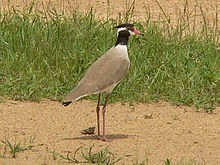Wacha (Niger)
| Wacha rural community | ||
|---|---|---|
|
|
||
| Coordinates | 13 ° 22 ′ N , 9 ° 18 ′ E | |
| Basic data | ||
| Country | Niger | |
| cinder | ||
| department | Magaria | |
| ISO 3166-2 | NE-7 | |
| Residents | 65,200 (2010) | |
Wacha (also: Ouacha ) is a rural community in the Magaria department in Niger .
geography

Wacha is located southeast of the regional capital Zinder and is at the transition from the large Sudan to the Sahel zone . The municipality borders on the department of Mirriah to the north and west , the municipality of Gouchi to the east and the municipality of Dungass to the south . The municipality is divided into 53 administrative villages, 39 traditional villages, 59 hamlets, 20 camps and a water point. The main town of the rural community is the administrative village of Wacha. The Wadi Korama runs through the municipality .
history
Wacha was built in 1836 under Djibril Dodo, whom the Sultan of Zinder had appointed as Sossébaki ruler, as a mansion. The Hausa dynasty of the Sossébaki traced their rule, which had existed for several centuries, to a prince from Bornu . Two other Sossébaki states were in Mirriah and Takey . For reasons of age, Djibril Dodo was replaced as ruler of Wacha by his son Mohamed in 1864. Mohamed went to war against Kano for Zinder , but was deposed in 1878 by Sultan Ténimoun dan Sélimane . Subsequently, depending on the will of the ruling Sultan von Zinder, Mohamed's sons Harouna and Yacoubou were alternately the rulers of Wacha.
The place fell to France at the beginning of the 20th century . The Wacha market was one of the major markets in the region approved by the French administration at the time.
The rural community of Wacha emerged from the canton of Ouacha in 2002 as part of a nationwide administrative reform.
population
At the 2001 census, Wacha had 48,020 inhabitants. For 2010, 65,200 inhabitants were calculated. In Wacha members live mainly of agriculture based Hausa subgroup Sossébaki which mainly Agropastoralismus operated Fulani subgroup Daourawa and on remote pasture specialized Fulani subgroups Bornanko'en and Katchinanko'en.
Economy and Infrastructure
There is a cattle market in the village of Gayi. The market day is Thursday.
Personalities
- Laouali Chaibou (* 1960), manager and politician
literature
- G. Brouin: Un îlot de vieille civilization africaine: le pays de Ouacha (Niger Français) . In: Bulletin du Comité d'Etudes Historiques et Scientifiques de l'AOF . tape 21 , 4, September – October, 1938, pp. 469-479 .
- Saley Maman: Contribution à l'étude de l'histoire des Hausa: les Etats tsotsebaki des origines au XIXe siècle . Dissertation. Universite Libre de Bruxelles, Brussels 1994.
Web links
Individual evidence
- ↑ a b Répertoire National des Communes (RENACOM). Institut National de la Statistique website, accessed November 8, 2010.
- ↑ Republic of Niger: Loi n ° 2002-014 du 11 JUIN 2002 portant création des communes et fixant le nom de leurs chefs-lieux http://www.case.ibimet.cnr.it/den/Documents/code_rural/cdrom/doc % 20pdf / Loi% 20N% B02002-14% 20cr% E9ation% 20des% 20communes.pdf (link not available)
- ↑ Edmond Séré de Rivières: Histoire du Niger. Berger-Levrault, Paris 1965, pp. 131-132.
- ↑ Hassane Gandah Nabi: Commerçants et entrepreneurs du Niger (1922-2006) . L'Harmattan, Paris 2013, ISBN 978-2-336-29136-9 , pp. 37 .
- ^ Institut Nationale de la Statistique du Niger (ed.): Annuaire statistique des cinquante ans d'indépendance du Niger. Niamey 2010 ( online version ; PDF; 3.1 MB), p. 57.
- ↑ Ministère de l'élevage et des industries animales / République du Niger (ed.): La mobilité pastorale dans la Région de Zinder. Stratégies et dynamisme des sociétés pastorales. Niamey 2009 ( online version ( Memento of July 13, 2010 in the Internet Archive ); PDF; 11.3 MB), pp. 30 and 33.
- ^ Mahamadou Saley, Yatta Paul Maurice Mohamed: Projet Régional d'Appui au Pastoralisme au Sahel (PRAPS). Etude diagnostique des Systèmes d'Information sur les marchés à bétail du Burkina Faso, du Mali, de la Mauritanie, du Niger, du Sénégal et du Tchad. Définitif report. (PDF) CILSS , November 2016, accessed on May 2, 2018 (French).
